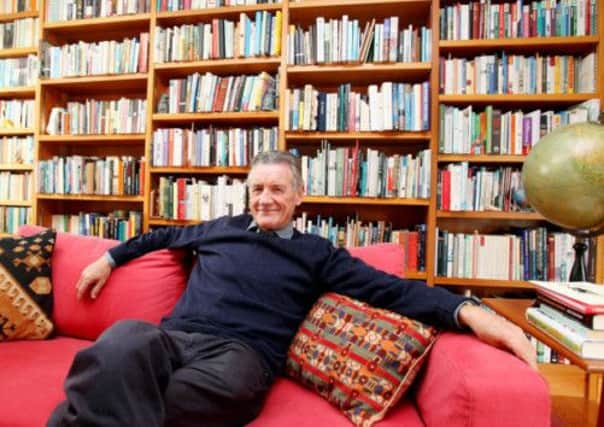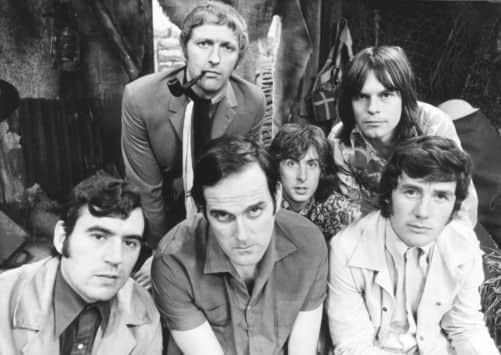The Big Interview: Michael Palin


MENTION the name Michael Palin and people usually smile. To some, he will always be the man getting walloped by John Cleese with a giant halibut in the fish slapping dance, or the shopkeeper in the legendary dead parrot sketch during his days with Monty Python. For others, he’s the intrepid traveller tirelessly circumnavigating the globe equipped with a seemingly endless supply of neatly pressed chinos and blue shirts.
Either way, Palin is one of those rare figures in the public eye, like Sir David Attenborough or Dame Judi Dench, who people warm to no matter what their age or background. He’s come to embody fairness and decency as well as that typically British sense of gentle, self-deprecating humour and last weekend he was given a standing ovation at the Baftas, where he was presented with a Bafta fellowship by fellow Monty Python star Terry Jones.
Advertisement
Hide AdAdvertisement
Hide AdModest as ever, Palin said it was a great honour for which he felt deeply unworthy, adding: “It is an award for thoroughly enjoying myself for the last 48 years.”


If he’s enjoyed himself then we’ve enjoyed watching him and next month he returns to Yorkshire where he will be “in conversation” with journalist Miranda Sawyer as part of the Sheffield Doc/Fest, which is celebrating its 20th anniversary.
Palin, who recently turned 70, was born in Sheffield and grew up there before moving to London in the mid-60s. “I always like coming back because I have a strong link with the city. Anywhere that’s been your home for the first 20-odd years of your life has got to influence you and Sheffield has influenced me in some ways, I’m sure of that,” he says.
“It was once said that one of the great things about the Monty Python team was that we were all provincial, we weren’t from London. We were outsiders and that gives you a certain attitude to life because you’re on the outside looking in. That was good for us because it meant we stayed independent and weren’t part of the metro set.”
Advertisement
Hide AdAdvertisement
Hide AdHe’s quick to point out he’s not being disparaging about London, where’s he lived for over 45 years, just that there is a world outside the capital. “It’s an interesting city with a lot going on but it’s easy to see it as the centre of everything, and coming up to Sheffield is a reminder that there are places outside London with different people and different attitudes.
“Sheffield has a strong character although the city hasn’t been blessed with lucky breaks. It’s lovely now but it’s faced tough times, especially in the 1980s when industry was in decline. The rebuilding that took place after the war wasn’t a success and it looked run down. But coming back now I feel optimistic about the future.”
As a child Palin was fascinated with far away places long before he harboured any ideas of being a performer or writer. “I was 10 when Everest was conquered which seemed an extraordinary thing to happen. It had always been this unclimbed mountain and suddenly there were people on top of it and at the same time people were travelling up the Amazon and trekking to the Arctic. I wanted to be an explorer but the problem was everywhere was being explored and I wasn’t growing up fast enough,” he says.
“I often wonder whether growing up in Sheffield had something to do with this because there was so much to see. There was the Peak District on one side and heavy industry on the other, you had rivers and gorges and crags that looked like they were straight out of an American western film. I loved spending a day away from home on my bike because Sheffield rewarded the traveller and walker.”
Advertisement
Hide AdAdvertisement
Hide AdIt’s almost 25 years since Palin made his first TV travel documentary for the BBC, Around The World in 80 Days. The series, which saw him recreate the famous voyage made by Phileas Fogg in Jules Verne’s epic novel, was a phenomenal success – although Palin wasn’t the first choice. Alan Whicker, the doyen of the travel documentary, was among those who reportedly turned down what was a pretty gruelling challenge that involved journeying through potentially hostile places in frequently scorching temperatures.
Palin, though, jumped at the chance. “At that time I was a writer and actor and I’d just finished A Fish Called Wanda. I enjoyed travelling but I’d only ever really travelled on business so it did have a certain appeal to me.” Even so he assumed it would be a one-off. “I thought I would just be doing the one programme and that would be it,” he says.
The fact he wasn’t a seasoned traveller meant he was entering uncharted water. “Spending seven days on a dhow sailing across the Persian Gulf, you either love it or hate it, and I loved it because it gave me a sense of freedom. There was just a small team of six of us and we decided what we were going to film and how hard we were going to work.” However, by the time they returned home he still wasn’t sure they had a series people would be interested in. “We came back and I just thought ‘what are we going to get out of it?’ because I’m not a qualified TV presenter.”
As it turned out, Around The World in 80 Days proved to be compulsive viewing. “What actually came out was miraculous,” says Palin, with a chuckle. “Lots of things went wrong, like me feeling ill on the boat, but these were the things people really valued. I think it came over as a naturalistic view of the world and people seemed to like seeing the world through the eyes of someone not that much different from themselves.” Since then, Palin has carved out a successful career as a TV presenter though travel documentaries such as Pole to Pole, Full Circle and, most recently, Brazil – a country he visited for the very first time, travelling from the lost world of Amazonia to the buzzing metropolis of Rio de Janeiro.
Advertisement
Hide AdAdvertisement
Hide AdWhile he might come across as the ideal travelling companion, heading to far flung places isn’t for the faint-hearted. “You have to want to do it, there’s no question of saying ‘I’ll give it a go,’ and then dropping out halfway through. So I had to say ‘right, for the next two years I’m going to devote my time to this journey.’ It does take over your life but once you’ve mentally adjusted yourself to this then you just get on with it.”
It’s probably easier to name the countries he hasn’t been to than those he has, but rather than becoming the clichéd world-weary traveller who’s had too much of a good thing, Palin has retained an innate curiosity. “It’s important to keep a sense of wonder, you can’t turn to the camera looking bored stiff because you’ve seen it all before,” he says. Which is why Palin leaves the director to do the reconnaissance work. “That way if I get talking to someone on a train it happens naturally and it’s not staged.”
But heading off to remote or unstable countries must bring added risks? “I’m an optimist so I don’t look at the glass and see it as half empty. Also if you’re too timid and too nervous and listen to everything people say you’d probably never go anywhere.”
However, he admits there have been some close shaves. “There was a situation in Sudan. We were in a small town outside Khartoum and our cameraman was leaning out of the car window taking photographs of this guy sitting in the town square. But he noticed the photographer and started waving his finger at him. A crowd built up very quickly and started rocking the car and suddenly it was looking quite dangerous. If it hadn’t been for the quick thinking of our minders who put their foot down and drove off it could have turned nasty. But I trust people and I find most times they reciprocate that.”
Advertisement
Hide AdAdvertisement
Hide AdHe says there are occasions, particularly at airports or border crossings, when it’s wise to put your cameras away. “It’s a shame because you see a lot of interesting things but border guards don’t like having their picture taken.”
Equally, people can be surprising. “We were in Pakistan and Afghanistan just after 9/11 and you might think people there would be hostile towards us but their first thought was to be hospitable and friendly and offer a drink to a fellow traveller. I think we sometimes have a very polarised view of the world and it’s not like that. People are as curious about you as you are about them.”
It’s important, he says, to know what you’re doing. “Our programmes aren’t political or anthropological, they’re entertainment and we have to make sure we don’t become too serious because we’re not there to solve the world’s problems.”
Having said that, he has learnt a thing or two about making travel documentaries. “It’s important to be honest and let people speak for themselves, and not to make jokes with men if they have guns.”
Advertisement
Hide AdAdvertisement
Hide AdAnd there are still places he would like to visit. “I remain curious about the world and the Middle East is somewhere I’ve never really explored, apart from Egypt indirectly. There are so many stories to be told in places like Iran and Iraq that have so much history. Syria is another country I’d love to visit although that’s not easy at the moment.”
But what is it about travelling to foreign lands that he finds so alluring?
“I find it interesting because it is. I like being put in different situations because it makes you challenge your accepted views and prejudices and it stops you being smug and comfortable.”
He also believes there is a universal bond between people in the world. “It doesn’t matter how different your culture is, or your background, or financial situation, there is something very basic that binds people together.
Advertisement
Hide AdAdvertisement
Hide Ad“Wherever I’ve gone I’ve been treated as a fellow traveller and human being. Whenever you go to a poor village there’s always someone there to offer you a drink, or show you their home, even if it’s just a mud hut, and I find that very inspiring.”
Michael Palin is “in conversation” with Miranda Sawyer at The Crucible, Sheffield, on June 13 at 7pm. For more information go online to www.sheffield theatres.co.uk/ event/ michael-palin-in- conversation-13/